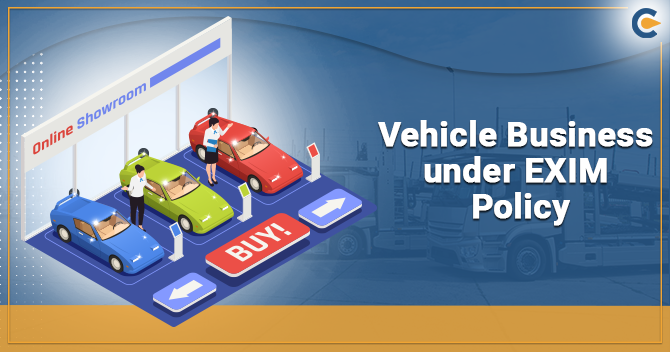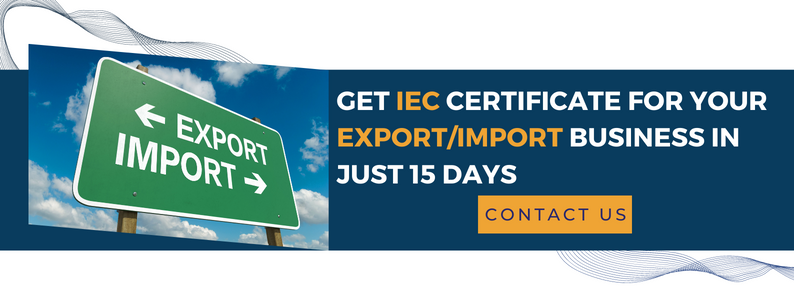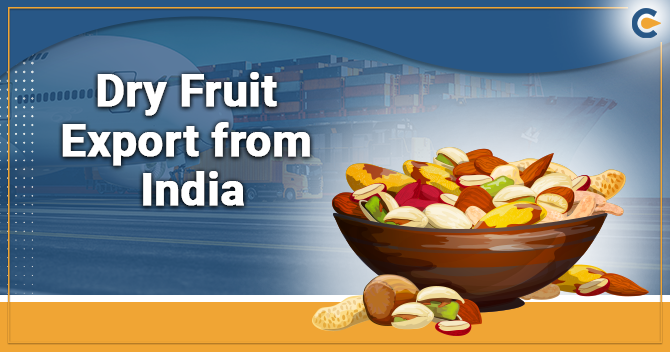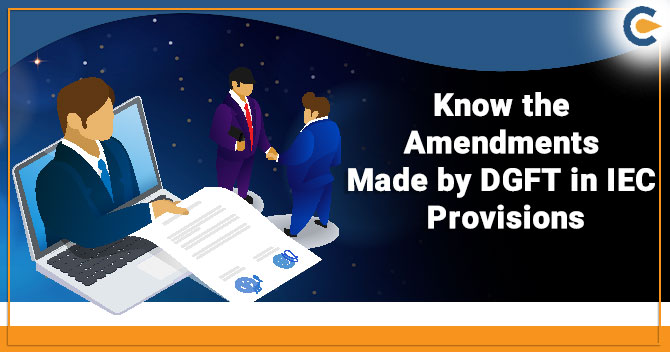Shipping vehicles from the overseas location could be an intimidating task for any new importer. If you wish to enter into the business of global trading then you must ascertain legal obligations associated with this form of business. Import Export Code is one such prerequisite that every individual has to avail who is looking to enter into the global business.
IEC is a 10-digit number code provided to the individual involved in international trading by the regional office of the Directorate General of Foreign Trade (DGFT). In general, the IEC registration is required to be attached in the shipping documents for obtaining clarification from the customs and other authorities. In short, this code helps in averting legal constraints involved with the customs clearance inclusive of shipment inspection.
Exporting Vehicle to An Overseas Client
The exporting procedure begins with the inspection of the sample which is supposed to be exported to the foreign client. For this, the exporter may ship the vehicle as a sample to the prospect and waits until he/she receives the approval of the buyer. After approving the sample, the importer may ask the exporter to forward the terms of payment and delivery*.
- After approving the contract of sale, the exporter will then sent the proforma invoice to the importer enclosing the complete detail of the sale. The buyer, in response to this, places an order in form of a Letter of credit or purchase order.
- After receiving the export order, the seller initiates the exporting formalities such as arranging the document like export order, packing list, certificate of origin, etc. This may also include a pre-shipment inspection requested by the importer.
- In the next step, the exporter will drop the request for shipment of goods at the freight carrier. Depending on the contract detail, the exporter may ship the goods either on FCL (full container load) or LCL (Less Container Load).
This is a general overview of an exporting process. The next section will discuss the IEC and Harmonized System Codes followed by some information on EXIM policy.
What is the Harmonized System Codes?
The Harmonized System Codes is essentially regarded as product classification code that helps the custom and other authorities to identify the product during the inspection process. If you wish to ship a vehicle to any country or establish an exporting business then you must be familiarized with this coding system.
Import of Vehicles under EXIM Policy
Exim Policy of India has underpinned some strict provisions related to the import of vehicles. According to the EXIM Policy, the imported vehicle should not carry the following attributes:
- The vehicle should not be manufactured in India
- The vehicle should not be part of the selling or lease contract.
- The vehicle should not show non-conformity with the Central Motor Vehicles Rules (CMVR), 1989.
Apart from the said provision, the EXIM policy also states that the vehicle should not be imported from a country other than the country of manufacture.
The import of new automobile will be subjected to the following provisions of the Indian Government
1. A new imported vehicle shouldn’t be a vehicle that:-
- manufactured/assembled in India; and
- sold, leased, or loaned before making its way to India; or
- Has been registered for use in any nation as per the laws of that nation, before importation into India.
2. The importation of new automobiles shall be subjected to the given conditions:
- The new vehicle must have
- A speedometer that shows speed in km / h;
- Right-hand steering, and controls other than two and three-wheelers.
- photometry of the headlights to suit “keep-left” traffic; and
- Imported from the country of manufacture.
- Also, the new vehicle shall be in line with the provisions of the Central Motor Vehicles Act, 1988, on the date of import.
- The import of new automobiles will be allowed via the Indian Customs Port at Nhava Sheva (Mumbai), Calcutta, and Chennai.
Import of Old Vehicles
The Indian Government has permitted the entry of used automobiles into the nation only via Mumbai port. The Ministry of Commerce has to pinpoint six categories of used automobiles in terms of their cylindrical capacity for which import is allowed.
1. A second hand or old vehicle shall be referred to as an automobile that:-
- has been sold or loaned before making its way to India; or
- has been registered in any nation as per the laws of that nation, before importation into India;
2. The import of the old vehicles shall be subjected to the given conditions:-
- The used or old vehicle shall not be served more than three years of service life from the date of manufacture; The used vehicle must have:
- Right-hand steering, & controls in case of four-wheelers only.
- a speedometer showing the speed km / h, and
- photometry of the headlights to suit “keep left” traffic.
- Also, the used vehicle shall not adhere to non-conformity with provisions of the Motor Vehicle Act, 1988[1] on the date of import.
- Import of old vehicles shall be permitted only via customs port at Mumbai.
- The used or old vehicles should have a minimum roadworthiness of not less than 5 years from the date of import with service assurance facilities within the nation during the five years.
Banned Vehicles
The policy forbade the import of vehicles whose engine capacity ranges from 1000 to 2500cc. In the case of two-wheelers, scooters equipped with an engine capacity of over 50 cc to 500cc are allowed for importation. Motorcycle engine capacity must lies between 250 to 800 cc.
Importation of Cars under Transfer of Residence
Any overseas individual coming to India on a transfer basis is permitted for the importation of one vehicle. The imported automobile could be old or new. However, it is vital that vehicle ought to be imported into India within six months of the arrival of overseas nationals.
The imported vehicle adheres to the condition of No sale for two years, which will be permitted by the Customs Authorities on the passport during importation and by the Regional Transportation Authorities when such automobiles are presenter for registration in the country of import.
Import of Passenger Cars/Jeeps / Multi-Utility Vehicles Etc
The conditions prescribed for the importation of new and old automobiles is not applicable to the import of passenger/ Jeeps/cars/ multi-utility vehicles etc. The said vehicles may be imported in the country after making payment regarding custom duty. The Directorate General of Foreign Trade (DGFT) may, however, allow relaxation of these conditions by publishing in this Public Notice in special circumstances.
Procedure to Avail IEC for Vehicle Business under EXIM Policy
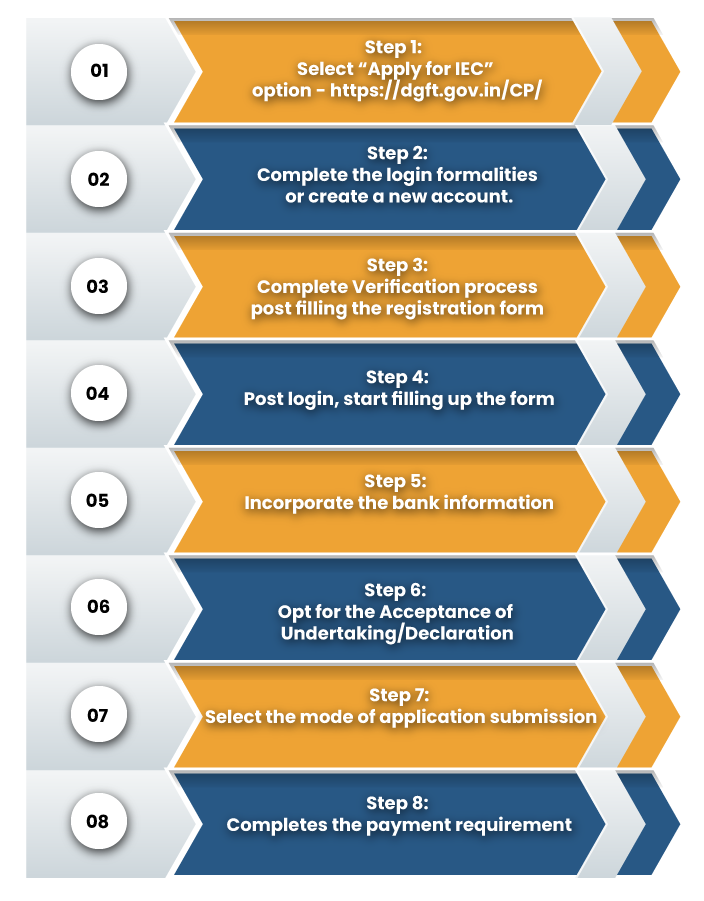

Documents required to Avail IEC Number
- PAN of the company or the person.
- Individual’s voter ID, passport or Aadhar card copy.
- Cancel cheque copy of the person or company.
- Copy of utility bill (electrical, gas, or water bill) or Rent Agreement of the premise.
Conclusion
Indian EXIM Policy encloses several policy-related decisions taken by the Indian Government in the sphere of Foreign Trade, i.e., w.r.t import & exports from the country & export promotion measures, procedures, and policies related thereto. Trade policy is outlined by the central government in association with the Ministry of Commerce.
India’s EXIM policy is also regarded as Foreign Trade Policy which aims at improving export performance, developing export potential, encouraging and foreign trade. One has to take every precise detail into the account while importing a vehicle from an overseas client. Connect with CorpBiz professional if you need some technical guidance or services on the IEC.
Read our article:How the IEC for Startup could be Beneficial in India?




